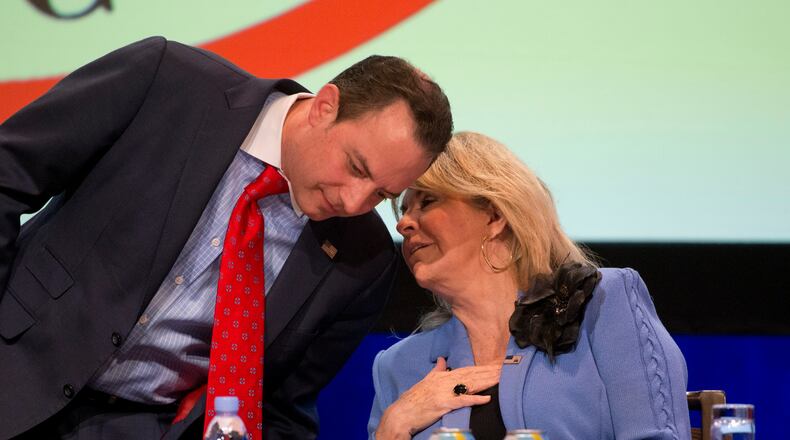CLEVELAND – With their convention only days away, top Republicans on Wednesday began a final, multi-day attempt to tamp down a rebellion among some delegates uncomfortable with naming billionaire Donald Trump as their presidential nominee.
At a welcoming meeting of the ruling Republican National Committee, the party’s top lawyer said the theme song of next week's gathering, just off the shores of Lake Erie, could be found in an old hymn that blessed “the ties that bind.”
Unless opponents can muster the votes to change how the convention operates, delegates bound to Trump will remain so, assuring that the candidate who won the majority of primary and caucus delegates will top the GOP ticket, said John Ryder, a Memphis attorney and RNC general counsel.
“All of y’all have undoubtedly received emails that begin with the sentence, ‘No delegate is bound.’ That’s not true,” the attorney said.
So the fate of the never-Trump movement, which already appears to be weakening, will be decided in a two-day session of the convention rules committee that begins Thursday. If anti-Trump forces are to survive, they must find 28 votes on the 112-member panel – enough to pass a minority report that could recommend freeing delegates to vote for whomever they please. The minority report would be subject to a vote by the entire convention.
“We’ve never seen a circumstance like this, where all 2,500 delegates would vote on the floor for something this consequential,” said Texas Republican strategist Matt Mackowiak, an RNC delegate and an ally of U.S. Sen. Ted Cruz of Texas, Trump's strongest rival during the primaries. (Cruz has accepted a speaking role at the convention, but has not endorsed Trump.)
Uncertainty could reign, Mackowiak said, just before the RNC meeting began. “It’s not just never-Trump or always-Trump. There may be delegates who support Trump but believe delegates should be unbound. Or Cruz supporters who feel delegates are bound,” he said.
Steve Duprey, a New Hampshire delegate and rules committee member, was decidedly in the pro-Trump camp. “I hope that people get their fair debate on an issue and they lose and they call it a day,” Duprey said. “I’m against it. Can you imagine me, coming from New Hampshire, where we have the first primary, saying, ‘I am so wise and omnipotent, that I’m going to substitute my judgment for 52 percent voter turnout’? It kind of undercuts the whole rational for a primary.”
In the hallways, delegates buzzed about Trump’s coming choice for a running mate. But inside the meeting, Reince Priebus, chairman of the RNC, set the tone for a four-day convention that could focus more on Hillary Clinton, the presumptive Democratic nominee, than Trump himself.
“We at the RNC are holding her feet to the fire every day for her above-the-law mentality,” Priebus said in brief remarks that referenced Clinton 15 times and Trump twice.
Sharon Day, the RNC co-chair, did likewise, leading to a quip from Tony Parker, the party treasurer who followed them both: “I’ll try to be a little more measured, other than saying Hillary after every sentence.”
But even as Priebus and others spoke, the difficulty of reining in such an unconventional candidate as Trump was made obvious by an Associated Press report immediately picked up by reporters at the back of the room: Trump was seeking $10 million in damages from a former staffer for allegedly leaking information about the campaign’s inner workings to the press.
From within the room, Mackowiak, the delegate from Texas, sent the following message over Twitter: “Trump suing a fired staffer is a good way to sabotage the news cycle building around a VP choice & the convention. Makes no sense.”
About the Author
The Latest
Featured




